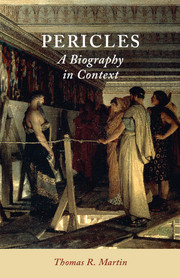Book contents
- Frontmatter
- Dedication
- Epigraph
- Contents
- List of Illustrations
- List of Maps
- Acknowledgments
- Chronology
- Pericles' Alcmeonid Family Tree
- Introduction: A Biography of Pericles in the Context of the Ancient Sources
- 1 The Notorious Family History of Pericles' Mother
- 2 The Harsh Lessons of the Career of Pericles' Father
- 3 Pericles Becomes a Teenager during a Family Crisis and a National Emergency
- 4 Pericles Becomes a Refugee during Athens' Greatest Peril
- 5 Pericles Becomes an Adult as Athens Builds an Empire
- 6 Pericles' Innovative Education for Leadership in Athenian Democracy
- 7 Pericles Becomes a Leader as Athens and Sparta Become Enemies
- 8 Pericles Becomes the First Man of Athens
- 9 Pericles' Responsibility for the Samian Revolt and the Peloponnesian War
- 10 Pericles' Fate, Then and Later
- Suggested Readings
- Index
3 - Pericles Becomes a Teenager during a Family Crisis and a National Emergency
Published online by Cambridge University Press: 05 August 2016
- Frontmatter
- Dedication
- Epigraph
- Contents
- List of Illustrations
- List of Maps
- Acknowledgments
- Chronology
- Pericles' Alcmeonid Family Tree
- Introduction: A Biography of Pericles in the Context of the Ancient Sources
- 1 The Notorious Family History of Pericles' Mother
- 2 The Harsh Lessons of the Career of Pericles' Father
- 3 Pericles Becomes a Teenager during a Family Crisis and a National Emergency
- 4 Pericles Becomes a Refugee during Athens' Greatest Peril
- 5 Pericles Becomes an Adult as Athens Builds an Empire
- 6 Pericles' Innovative Education for Leadership in Athenian Democracy
- 7 Pericles Becomes a Leader as Athens and Sparta Become Enemies
- 8 Pericles Becomes the First Man of Athens
- 9 Pericles' Responsibility for the Samian Revolt and the Peloponnesian War
- 10 Pericles' Fate, Then and Later
- Suggested Readings
- Index
Summary
Pericles reached his teenage years in the later 480s. He was growing up in an Athens that was becoming mainland Greece's most populous city-state, the term that modern scholars have adopted to describe ancient Greek political communities consisting of a large urban center controlling a territory also populated with smaller outlying villages and farmsteads. Citizens could live anywhere in the city or the countryside. The Greek word for city-state was polis, the source of the modern word “politics.” During the fifth century, the number of adult male citizens entitled to exercise political rights and required to serve in the citizen militia probably crested somewhere between 40,000 and 60,000. Overall, the polis of Athens grew to a population that probably totaled 250,000 or more, counting everyone: male and female citizens and their children, resident foreigners, and slaves. This was an extremely large population for an ancient Greek polis. Of the more than 1,000 ancient city-states whose existence is documented, most had far, far smaller numbers of people residing within their borders.
The territory of Athens, known as Attica, occupied a triangular peninsula of plains, hills, and small mountains in southeastern mainland Greece. Athenians, like the inhabitants of other Greek city-states, devoted the majority of their land to agriculture, but they were especially fortunate to have a coastline dotted with good ports for sea commerce. By the time Pericles was an adult, the population of Attica had grown so large that it outstripped the land's capacity to produce enough food to feed everyone. Merchants therefore began to import large amounts of essential supplies, especially raw grain, from fertile areas to the northeast in the Black Sea region and to the southeast in Egypt. These bulk imports of grain were transported aboard ships plying the Mediterranean Sea, which made for a risky business enterprise because storms could easily wreck the transport vessels.
Porridge and bread made from barley and wheat, supplemented by vegetables, olive oil, and cheese, represented the main source of nutrition for ancient Greeks. Most people could not afford meat as a regular item in their diets, and they therefore highly valued the distribution of cooked portions from large-scale animal sacrifices financed by the state.
- Type
- Chapter
- Information
- PericlesA Biography in Context, pp. 64 - 79Publisher: Cambridge University PressPrint publication year: 2016



